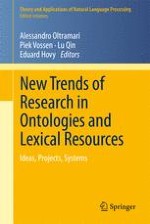2013 | OriginalPaper | Chapter
4. On the Role of Senses in the Ontology-Lexicon
Authors : Philipp Cimiano, John McCrae, Paul Buitelaar, Elena Montiel-Ponsoda
Published in: New Trends of Research in Ontologies and Lexical Resources
Publisher: Springer Berlin Heidelberg
Activate our intelligent search to find suitable subject content or patents.
Select sections of text to find matching patents with Artificial Intelligence. powered by
Select sections of text to find additional relevant content using AI-assisted search. powered by
